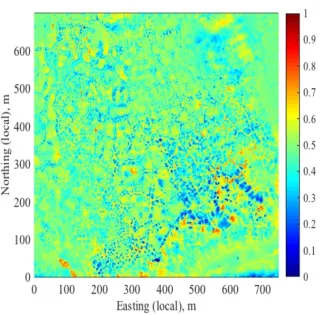Integration of Unmanned Aerial System, Surface Geophysics & other Multi-Scale Data to Map Arctic Snow Depth
This paper aims to develop an effective strategy to characterize heterogeneous snow depth over the Arctic tundra, using state-of-art techniques (ground-penetrating radar and UAS phodar) and also to quantify the relationship between snow depth and topography. All the techniques provided fairly accurate estimates of snow depth, while they have different characteristics in term of acquisition time and accuracy. We then investigated the spatial variability of snow depth and its correlation to micro- and macrotopography using the wavelet approach. We found that the end-of-winter snow depth was highly variable over several-meter distances, affected primarily by microtopography. In addition, we developed and implemented a Bayesian approach to integrate multi-scale measurements for estimating snow depth over the landscape.
We developed a Bayesian approach to integrate a variety of state-of-art snow sensing techniques – in situ measurements, ground-penetrating radar, phodar on unmanned aerial system (UAS) and airborne lidar – for mapping highly heterogeneous snow depth over ice-wedge polygonal tundra. Our analysis also showed that the end-of-winter snow depth was highly variable in several-meter distances, influenced by microtopography.
Snow plays a critical role in Arctic ecosystem functioning, as it influences permafrost thaw, water delivery and carbon exchange. Snow depth is, however, extremely heterogeneous, and traditionally difficult to map in sufficient resolution using conventional point measurements. Although there have been significant technical advances in measuring snow depth (e.g., geophysics and remote sensing), it is still challenging to integrate all these state-of-art data in a harmonized manner due to their different scales and accuracy. The developed Bayesian approach will be an integrating framework for these advanced datasets, allowing us to mesure snow depth at high resolution over a large area.
Wainwright, HM, AK Liljedahl, B Dafflon, C Ulrich, JE Peterson, A Gusmeroli, and SS Hubbard. 2017. Mapping snow depth within a tundra ecosystem using multiscale observations and Bayesian methods, The Cryosphere, 11:857–875, https://doi.org/10.5194/tc-11-857-2017
This research was supported by the Director, Office of Science, Office of Biological and Environmental Research of the US Department of Energy under Contract No. DE-AC02-05CH11231 as part of the Next-Generation Ecosystem Experiments (NGEE Arctic) project.
For more information, please contact:
Stan Wullschleger
wullschlegsd@ornl.gov

